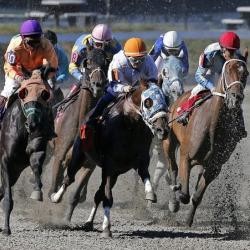Horse Tracks Concerned Over Move To Cut Subsidies

Millions of people tune in to watch the Kentucky Derby and other races of the Triple Crown, but the US horse racing industry is still largely in decline, and as interest dwindles, so too do its revenues, leaving the horse racing industry suffering in many states. Looking ahead, times are likely to get even tougher for horse tracks owners and breeders, as many states are considering, or have already ended subsidies that are currently helping the industry to operate in the black.
One such example is provided by the state of Massachusetts, whose subsidies have been in the spotlight recently because the owner of New England’s remaining thoroughbred track, Suffolk Downs, has been mulling turning the property into a stadium or some other major entertainment facility, in the process leaving the industry without a home. Commenting on the issue, Kathy Guillermo, senior vice president at People for the Ethical Treatment of Animals (PETA), said:
“Massachusetts is an extreme case. You’ve got all this money coming in and really nowhere for it to go. It begs the question: Why are we continuing to sink millions of dollars in an industry that’s shrinking?”
Assistance for the Horse Racing Industry
In order to help the horse racing industry and keep small businesses open, 20 US states currently offer assistance to horse racing businesses. These states subsidize breeders and tracks by giving part of the revenue made by casinos and slot machine parlors to these businesses. The idea behind this move is that businesses can use the money in order to make betting on races more attractive. Tracks can use the funds to provide bigger purses, making races more competitive to attract more bettors, with most states having regulations in place regarding what can be specifically be done with the subsidies. Furthermore, industry proponents often cite the extra jobs created by propping up the horse racing industry, and as Karen Painter, owner of Blue Spruce Farm in Kearneysville, West Virginia, explains:
“We just don’t know what they’re going to do. We’re dealing with people that don’t always understand the contribution the equine industry as a whole has on the economy.”
Criticisms of the Current Subsidies
There are many state lawmakers and citizens who are now calling for an end to the subsidies. There are a number of complaints and concerns about the practice, including:
– Overall shortage of revenues: As more states legalize gambling, revenues are shrinking in many states, leaving lawmakers hesitant to divert some of the funds to the horse-racing industry. In states where there are large budget deficits, many people think it’s irresponsible to continue subsidizing race tracks.
– No assessment of need: In some states, all horse racing industry businesses can quality for the subsidies, leading to questions about whether or not the money is going to businesses who don’t even need it. A prime example is in Pennsylvania, where a Saudi Arabian prince was getting money from the subsidies.
– Risks to animals: Animal rights activists worry that pressure to put subsidies to use will mean overworking and over-training horses, putting them at risk.
– Too Much Government Interference: Some people argue that propping up the horse racing industry is simply the wrong thing to do and that if the industry is no longer able to attract bettors, it may no longer be worth sustaining.
Early Moves to Tighten the Purse Strings
A few states have already made changes to their subsidy systems. In 2011, New Jersey discontinued their $30 million annual subsidy to the horse racing industry completely. West Virginia has reduced the percentage of revenues from casinos and slots that is going to horse businesses. Delaware, Indiana and Iowa have revised their laws, and Massachusetts and Pennsylvania have been discussing doing the same.
While it’s unlikely that subsidies will completely stop in every state quickly, industry insiders anticipate a gradual reduction and eventual stoppage of the practice over the long term. It will be interesting to see what impact this will have on tracks and breeders, and if it will mean the end of racing completely.










